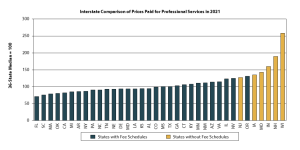We’ll get to what we missed in a second; first this – The slaughter in Buffalo and Uvalde had me focused elsewhere, as it did for many.
That focus must not shift as we celebrate Memorial Day with friends and family; we cannot just move on, as tempting as that is. Rather I’d encourage you to commit to doing something, to be a difference maker.
Please don’t just move on. Please.
- Get the facts about gun violence here.
- Support the Sandy Hook parents’ efforts here.
- Support Moms Demand Action here.
WCRI published two excellent studies this week…thanks to Andrew Kenneally for sharing the news.
The craziness of workers’ comp extends to the prices you pay doctors and therapists for care…how crazy you say?

Bonkers.
Docs in Florida are getting screwed (but FL hospitals are rolling in dough), while their counterparts in Wisconsin are making bank. Like so many things in comp, this makes zero sense.
Download Rebecca (Rui) Yang PhD and Olesya Fomenko PhD’s insightful study – for free – here.
There’s far too little information on the outcomes of chiropractic care. WCRI just published a multi-pronged analysis of chiropractic care’s impact on low back pain, with a comparison of costs and disability duration for patients treated by chiros vs other care givers.
An intro video is here.
The study, authored by Kathryn Mueller, Dongchun Wang, Randall Lea, M.D., and Donald R. Murphy is available for purchase here.
Have a safe weekend, and remember – Democracy depends on your involvement.



It’s time for action.
There are always “calls to action” after these kinds of horrific events, but they’ve fallen short. It’s time to rethink the role of behavioral healthcare in helping our young people when they are suffering. Our industry should be hyper-focused on caringly confronting this head on, bringing together really smart, insightful, compassionate, and committed people, so that we can do better for our kids and communities.
I think there are many factors that contribute to gun violence in America. I definitely don’t pretend to have solutions for them all. Yet as a behavioral healthcare leader, psychotherapist, dad, and someone who’s spent many years working with children and adolescents, I know our industry can show up more and better for at-risk kids before they commit acts of violence like we saw this week in Uvalde. By the time I would encounter these teens in residential or inpatient psychiatric facilities, they were often so aggressive and disengaged, we couldn’t really help them, no matter how hard we tried.
They typically disrupt the treatment setting more than they commit to treatment. They are at a point where they won’t take medications and are non-compliant with outpatient programs. Then it’s too late. The system of care will continue to fail teens unless we intervene earlier where they are in a better position to be helped. We need to be able to intervene early on to build the empathy they have for themselves, so that we can, in turn, help them have to have more empathy for others. But it must be thought about and acted on so much sooner than our current system supports.
As a behavioral health industry, we need to go on the offense.
We need a lot more mental health resources and support to reach all teens. Flexible, outpatient and other interventions, with evidence-based, engaging content. Interventions that are focused on skills and tools that equip teens to tolerate stress better, meaningfully connect with people and their purpose more, and see the power of their real potential. I can tell you…this is largely missing in the current approach.
We need preventative approaches and early detection. We need all the things that exist in medical care. Just as endocrinologists and cardiologists focus on diet and exercise with patients at risk for diabetes and cardiovascular disease, behavioral health should focus on giving teens the skills to develop empathy, tools to better understand their emotions, and practically-applicable ways to manage stressors in their relationships, especially at home and in school. We need to understand how critical, early, preventative attention and intervention can play a central role in saving lives. There are many more things that can be done so that a child/teen does not escalate to having the capacity to take another human life.
Will this work 100% of the time? No. 30% of the time? Maybe not. Is the problem a mental health problem more than a gun violence problem? That’s a convenient distraction. But if we go on the offense and focus our efforts as a mental health industry on lifting children up more, addressing their mental health needs earlier and better, and place the focus on information, education, support, and proper care, focused on empathy…we will have a come a long way.